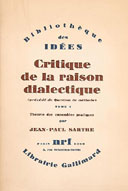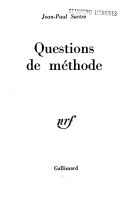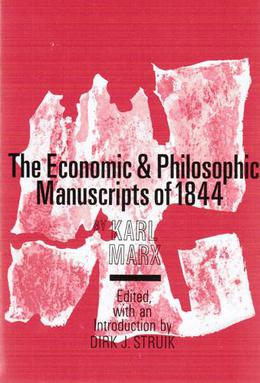Related Research Articles
Existentialism is a family of philosophical views and inquiry that study existence from the individual's perspective and explore the struggle to lead authentic lives despite the apparent absurdity or incomprehensibility of the universe. In examining meaning, purpose, and value, existentialist thought often includes concepts such as existential crises, angst, courage, and freedom.

Existentialism Is a Humanism is a 1946 work by the philosopher Jean-Paul Sartre, based on a lecture by the same name he gave at Club Maintenant in Paris, on 29 October 1945. In early translations, Existentialism and Humanism was the title used in the United Kingdom; the work was originally published in the United States as Existentialism, and a later translation employs the original title.

Karl Marx's theory of alienation describes the separation and estrangement of people from their work, their wider world, their human nature, and their selves. Alienation is a consequence of the division of labour in a capitalist society, wherein a human being's life is lived as a mechanistic part of a social class.

Critique of Dialectical Reason is a 1960 book by the philosopher Jean-Paul Sartre, in which the author further develops the existentialist Marxism he first expounded in his essay Search for a Method (1957). Critique of Dialectical Reason and Search for a Method were written as a common manuscript, with Sartre intending the former to logically precede the latter. Critique of Dialectical Reason was Sartre's second large-scale philosophical treatise, Being and Nothingness (1943) having been the first. The book has been seen by some as an abandonment of Sartre's original existentialism, while others have seen it as a continuation and elaboration of his earlier work. It was translated into English by Alan Sheridan-Smith.
Praxis is the process by which a theory, lesson, or skill is enacted, embodied, realized, applied, or put into practice. "Praxis" may also refer to the act of engaging, applying, exercising, realizing, or practising ideas. This has been a recurrent topic in the field of philosophy, discussed in the writings of Plato, Aristotle, St. Augustine, Francis Bacon, Immanuel Kant, Søren Kierkegaard, Ludwig von Mises, Karl Marx, Antonio Gramsci, Martin Heidegger, Hannah Arendt, Jean-Paul Sartre, Paulo Freire, Murray Rothbard, and many others. It has meaning in the political, educational, spiritual and medical realms.

Henri Lefebvre was a French Marxist philosopher and sociologist, best known for furthering the critique of everyday life, for introducing the concepts of the right to the city and the production of social space, and for his work on dialectical materialism, alienation, and criticism of Stalinism, existentialism, and structuralism. In his prolific career, Lefebvre wrote more than sixty books and three hundred articles. He founded or took part in the founding of several intellectual and academic journals such as Philosophies, La Revue Marxiste, Arguments, Socialisme ou Barbarie, and Espaces et Sociétés.

Nausea is a philosophical novel by the existentialist philosopher Jean-Paul Sartre, published in 1938. It is Sartre's first novel.
Kostas Axelos was a Greek-French philosopher.
In social theory and philosophy, antihumanism or anti-humanism is a theory that is critical of traditional humanism, traditional ideas about humanity and the human condition. Central to antihumanism is the view that philosophical anthropology and its concepts of "human nature", "man" or "humanity" should be rejected as historically relative, ideological or metaphysical.
Social alienation is a person's feeling of disconnection from a group – whether friends, family, or wider society – with which the individual has an affiliation. Such alienation has been described as "a condition in social relationships reflected by (1) a low degree of integration or common values and (2) a high degree of distance or isolation (3a) between individuals, or (3b) between an individual and a group of people in a community or work environment [enumeration added]". It is a sociological concept developed by several classical and contemporary theorists. The concept has many discipline-specific uses and can refer both to a personal psychological state (subjectively) and to a type of social relationship (objectively).

Search for a Method or The Problem of Method is a 1957 essay by the philosopher Jean-Paul Sartre, in which the author attempts to reconcile Marxism with existentialism. The first version of the essay was published in the Polish journal Twórczość; an adapted version appeared later that year in Les Temps modernes, and later served as an introduction for Sartre's Critique of Dialectical Reason. Sartre argues that existentialism and Marxism are compatible, even complementary, even though Marxism's materialism and determinism might seem to contradict the abstraction and radical freedom of existentialism.

Marx's Concept of Man is a 1961 book about Karl Marx's theory of human nature by the psychoanalyst Erich Fromm. The work sold widely thanks to the popularity of Marx's early writings, which was a product of the existentialism of the 1940s.
Marxist humanism is an international body of thought and political action rooted in a humanist interpretation of the works of Karl Marx. It is an investigation into "what human nature consists of and what sort of society would be most conducive to human thriving" from a critical perspective rooted in Marxist philosophy. Marxist humanists argue that Marx himself was concerned with investigating similar questions.
In Marxist philosophy, reification is the process by which human social relations are perceived as inherent attributes of the people involved in them, or attributes of some product of the relation, such as a traded commodity.

The correct place of Karl Marx's early writings within his system as a whole has been a matter of great controversy. Some believe there is a break in Marx's development that divides his thought into two periods: the "Young Marx" is said to be a thinker who deals with the problem of alienation, while the "Mature Marx" is said to aspire to a scientific socialism.
Neo-Marxism is a collection of Marxist schools of thought originating from 20th-century approaches to amend or extend Marxism and Marxist theory, typically by incorporating elements from other intellectual traditions such as critical theory, psychoanalysis, or existentialism. Neo-Marxism comes under the broader framework of the New Left. In a sociological sense, neo-Marxism adds Max Weber's broader understanding of social inequality, such as status and power, to Marxist philosophy.

The Economic and Philosophic Manuscripts of 1844, also known as the Paris Manuscripts or as the 1844 Manuscripts, are a series of unfinished notes written between April and August 1844 by Karl Marx. They were compiled and published posthumously in 1932 by the Soviet Union's Marx–Engels–Lenin Institute. They were first published in their original German in Berlin, and there followed a republication in the Soviet Union in 1933, also in German.
Marxist philosophy or Marxist theory are works in philosophy that are strongly influenced by Karl Marx's materialist approach to theory, or works written by Marxists. Marxist philosophy may be broadly divided into Western Marxism, which drew from various sources, and the official philosophy in the Soviet Union, which enforced a rigid reading of what Marx called dialectical materialism, in particular during the 1930s. Marxist philosophy is not a strictly defined sub-field of philosophy, because the diverse influence of Marxist theory has extended into fields as varied as aesthetics, ethics, ontology, epistemology, social philosophy, political philosophy, the philosophy of science, and the philosophy of history. The key characteristics of Marxism in philosophy are its materialism and its commitment to political practice as the end goal of all thought. The theory is also about the struggles of the proletariat and their reprimand of the bourgeoisie.
Western Marxism is a current of Marxist theory that arose from Western and Central Europe in the aftermath of the 1917 October Revolution in Russia and the ascent of Leninism. The term denotes a loose collection of theorists who advanced an interpretation of Marxism distinct from classical and Orthodox Marxism and the Marxism-Leninism of the Soviet Union.

History and Class Consciousness: Studies in Marxist Dialectics is a 1923 book by the Hungarian philosopher György Lukács, in which the author re-emphasizes the philosopher Georg Wilhelm Friedrich Hegel's influence on the philosopher Karl Marx, analyzes the concept of "class consciousness," and attempts a philosophical justification of Bolshevism.
References
Footnotes
- ↑ Poster 1975, pp. 210–212.
- ↑ Poster 1975, p. 211.
- ↑ Poster 1975, pp. 211–212.
- ↑ Poster 1975, pp. 213–214.
- 1 2 3 Poster 1975, p. 222.
- ↑ Poster 1975, p. 248.
- ↑ Poster 1975, p. 306.
- 1 2 Poster 1975, p. 220.
- ↑ Poster 1975, p. 221; Lefebvre 1982, p. 83.
- ↑ Poster 1975, p. 221.
- ↑ Poster 1975, p. 213.
- ↑ Poster 1975, pp. 230–231.
- ↑ Poster 1975, p. 220; Lefebvre 2024, p. 27.
- ↑ Lefebvre 2024, pp. 70–112.
- ↑ Poster 1975, pp. 240–242.
- ↑ Lefebvre 2024, pp. 192–210.
Bibliography
- Axelos, Kostas (1976). Alienation, Praxis and Techne in the Thought of Karl Marx. Translated by Bruzina, Ronald. London: University of Texas Press. ISBN 0-292-78013-3.
- Lefebvre, Henri (2024) [1968]. Everyday Life in the Modern World. Translated by Rabinovitch, Sacha. London: Routledge. ISBN 978-1-032-53393-3.
- Lefebvre, Henri (1982) [1966]. The Sociology of Marx. Translated by Guterman, Norbert. New York: Columbia University Press. ISBN 0-231-05580-3.
- Poster, Mark (1975). Existential Marxism in Postwar France: From Sartre to Althusser. Princeton, New Jersey: Princeton University Press.